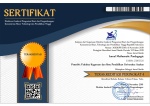EFEKTIVITAS PEMBELAJARAN MATEMATIKA MELALUI PEMBELAJARAN BERBASIS MASALAH PADA SISWA SMP DARMA MEDAN
Abstract
The aim of this study was to evaluate the efficacy of using problem-based learning methodology in the domain of mathematics education. This research falls into the Pre-Experimental Design category, which specifically utilizes one experimental group without a control group. This research consisted of a group of 25 class VIII students at SMP Darma Medan. This research specifically examines three of the four elements used to assess learning effectiveness. Variables that are considered in this context include educational goals, activities and obligations carried out by students, as well as responses and comments given by students. The instruments used consist of academic achievement assessments, monitoring sheets to observe student engagement, and surveys to assess student feedback. Descriptive analysis shows that the mathematics learning outcomes achieved are relatively high with an average score of 82.48. Regarding the evaluation of learning outcomes (1) 5 students (20%) did not meet the criteria, while 20 students (80%) achieved individual proficiency benchmarks. Thus, it can be concluded that students' mathematics learning outcomes after implementing problem-based learning strategies meet the requirements for achieving comprehensive classical learning goals. (2) The average level of student participation is 80.4%, thus meeting the criteria for active student involvement. (3) The student learning response rate was 80.5%, indicating acceptable results. After evaluating the three efficacy criteria, it can be concluded that the problem-based learning model has been effectively applied to class VIII students at SMP Darma Medan.
Keywords: effectiveness, mathematics, problem-based learning models,
Full Text:
PDFReferences
Afgani, J. 2010. Analisis Kurikulum Matematika. Skripsi tidak diterbitkan. Makassar: Univeritas Negeri Makassar
Arends, Richard I. 2008. Learning To Teach Belajar untuk Mengajar. Yogyakarta: Pustaka Pelajar.
Depdiknas. 2006. Kamus Besar Bahasa Indonesia. Jakarta: Balai Pustaka
Depdiknas. 2006. Standar Isi dan Standar Kompetensi Lulusan Beserta Kerangka Dasar dan Struktur Kurikulum untuk Satuan Pendidikan Sekolah Menengah Pertama beserta Peraturan Pelaksanaannya. Jakarta: Departemen Pendidikan Nasional Republik Indonesia
Khairiyah. R. (2018). Pengaruh Pembelajaran Matematika Berbasis Drama Terhadap Kemampuan Berpikir Metafora Siswa. UIN: Jakarta [Skripsi].
Riduwan.2018.Dasar-dasarStatistika.Bandung:Alfabeta.
Said, A. dan Budimanjaya. A. 2015. 95 Strategi Mengajar Multiple Intelligences. Jakarta : Prenada Media Group.
Sari, N. (2019). Peningkatan pemahaman konsep matematis melalui pembelajaran kontekstual pada siswa sekolah menengah pertama. JURNAL MATHEMATIC PAEDAGOGIC, 3(2), 144-150.
Sari, N. (2020). PENGARUH PEMBELAJARAN BERBASIS MASALAH PADA KEMANDIRIAN BELAJAR MATEMATIS SISWA SMK AR-RAHMAN MEDAN. Jurnal Mathematic Paedagogic, 4(2), 175-180.
Slavin. 2009. Cooperative Learning: Teori, Riset, dan Praktik. Bandung: Nusa Media
DOI: https://doi.org/10.36294/jmp.v8i2.3951
Refbacks
- There are currently no refbacks.





